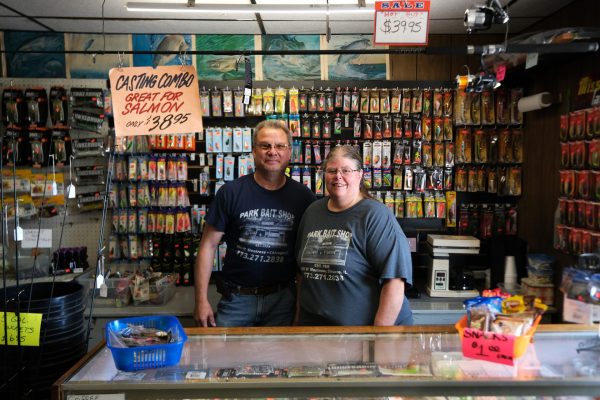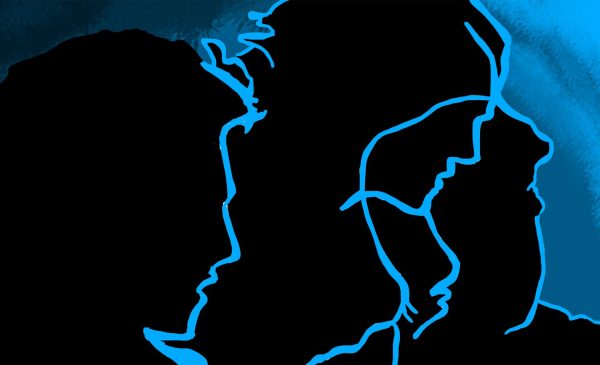Curves can’t be embraced when constantly sexualized
Credit: Alicia Goluszka | The DePaulia
I was wearing a red polo shirt and bell bottom khaki pants.
While working at the register, scanning the never-ending amount of items Target has to offer, my boss asked me to talk with him privately in a way that made me uneasy.
A woman had complained about my uniform saying my pants were too tight and it made her children uncomfortable. Her children were the ones uncomfortable with the way I was dressed, but I was uncomfortable being told that I was being looked at sexually by random shoppers.
Due to this complaint, I had to change. As I was crying in front of coworkers and shoppers, my boss had to buy me a new pair of pants because my butt was offending shoppers — as if the size of my backside was going to change with a new pair of pants.
I was 16.
It was my first job and the beginning of the sexualization of my body in the workplace. It has been a common theme to be told to cover up my already completely covered body while at work because my curves have brought offense to those who choose to look – something they can control, while I cannot control my shape.
Women are told to embrace their curves and love their body. That is quite challenging when you are constantly being told to wear less form-fitting clothes, longer shirts and bigger jackets. I wonder if a potato sack would suffice.
One in three women between the ages of 18-34 have been sexually harassed at work, according to Workplaces Respond, a national resource center. For working women, under no circumstances should they feel that such comments “are the way it is,” or that they should “get used to it.”
Gigi Wood, a senior at DePaul, had gotten her first real job in the industry and soon went on a work trip that resulted in her flying home early due to constant comments on her appearance.
“I was one of two women, the other being my boss, who was working on this portion of the event. I’m curvy, she isn’t,” Wood said. “I was the only one being harassed and we were both wearing event shirts and leggings.”
She was being harassed by several men on the trip that felt they could comment on her curves. One man sat down and apologized to her and said it was because she had a “huge ass.”
“They saw me, a curvy 21-year-old PR girl and judged me immediately,” Wood said. “They were never going to take me seriously or see me as anything other than a blondie with an ass.”
It has become so common to comment on a woman’s appearance at work that we have become both consciously and unconsciously insensitive to it, which is why it gets little attention.
Historically, women have been subordinated by society, manipulated in power struggles and used for sexual satisfaction. Looking at my chest or butt is not the way to get your kicks.
While both men and women have things to say about a curvy body, it is far more sexualized by men, with over 60 percent of women in the restaurant industry, hotel industry and farming industry being sexually harassed by men, according to Workplaces Respond.
“Both genders make comments,” Wood said. “With men, it’s usually catcalling, but I’ve had male friends make comments about my body shape in a derogatory way.”
Recent DePaul alumna Joanna Hernandez has dealt with the comments on her curves for years and has been treated differently because of them. Hernandez has been reprimanded for wearing leggings at work when slimmer coworkers have not. A coworker even admitted to her that she knows it’s because she is slimmer, which is why she can get away with it.
“I would definitely say I have a curvy figure, which I love,” Hernandez said. “My dresses always go to my knees or past my fingertips, and my shirts are never revealing. Despite all this, I’ve had people subtly comment about my appearance. ‘That dress is so cute. It’s really fitted. You almost look ready to go out.’ As I’m wearing a pinafore dress that goes to my knees with a white long sleeve and black tights under.”
The celebration of curves is diminished with every comment made and work is not a place for such comment in any way. With each remark, the growing uncomfortable feeling rises as embarrassment creeps in afterward.
“It’s all really frustrating,” Hernandez said. “Of course I have self-esteem issues, who doesn’t these days, and comments like this are not only detrimental to my level of comfort in my own body, but also debilitating to my focus on my job, which is more important than if my body looks extra curvy on any given day.”







Jane Marple / Jun 5, 2021 at 9:49 pm
I wish someone would write about the opposite of ‘curvy’. When you DON’T have curves you’re treated like absolute shit. Sexless, androgynous, inadequate failure of a ‘woman’ because ‘real women have curves. Why doesn’t anyone talk about that?
Enioluwa Akande / Apr 7, 2021 at 1:31 am
Being a woman of color I go through this everday. I have been told to change or adjust certain clothing in professional institutions in order to not “entice” men or get reported by annoying women who are jealous or feel insecure about themeseves. Moreover, I had an experience when a man that was supposed to do my nails was looking at my butt and breast through out the conversation he was having with me. It still makes my body crawl, I am in my 20’s and the ideology i have concerning most men is very negative. Moreover, i always thought it was because of what i wore that waranteed all these unwarranted sexual behaviors but now that i recall there are days when i wear long dresses or baggy clothes and i still experience the same thing.
Emily / Jan 2, 2021 at 8:21 pm
I can relate to this. I have been sexually harassed multiple times at work. I work in financial services as an accountant. I question what women can do to overcome the sexualized culture we are in. What do you do to stay sane and keep your dignity? Are there any organizations working to change our sexualized culture? I’d love to know as I want to get involved desperately in a mission that feels important to me.